I was fortunate to hear Seth Godin give a talk in London this last week. He led a packed room through a whirlwind tour of his ideas on marketing, business, and leadership at large.
This cartoon was inspired by something Seth covered early in the talk. He put up a few slides with photos from his local grocery store, including a massive 16-foot section with nothing but tofu. He asked the audience, "remember when tofu just came in 2 varieties? Plain and extra plain?"
The level of choice proliferation in the last decade is staggering. So much new product development is made up of incremental variations that don't really add anything new. Much of the time, a new product launch is just table stakes to keep another facing in the store. No wonder the new product hit rate is so low.
When I worked with ice cream, every new launch required seven items because that was the number of pints in an average ice cream shelf. A new line of seven gave us the greatest chance of nabbing extra shelf space in store. Flavors number six or seven were never as strong as the others, but we pushed them anyway. Writ large, it's easy to see how SKUs have expanded exponetially over the years.
I was thinking of this dynamic this weekend when I took my family to a museum in York with a reconstructed Victorian street, complete with a working Victorian grocery store. As a modern shopper (and marketer) taking a temporary step back in time, I was amazed by the lack of choice. But, I also found the relative quiet and simplicity kind of refreshing.
On the way out of town, our train passed a picturesque British town with a quaint old church on a hill, overlooking a 100,000 square foot ASDA (the British Wal-mart). It struck me how much choice proliferation we've seen over a relatively short period of time.
And it made me question how much of that choice is truly meaningful.
As a parting note, I feel compelled to share my "groupie" photo with Seth. This was the first time I'd met him (although he was nice enough to recommend my book in his blog last summer). When I posed a question from the audience after his talk, he introduced me to the room as the "world's best cartoonist on disfunctional marketing", which put me on Cloud 9.
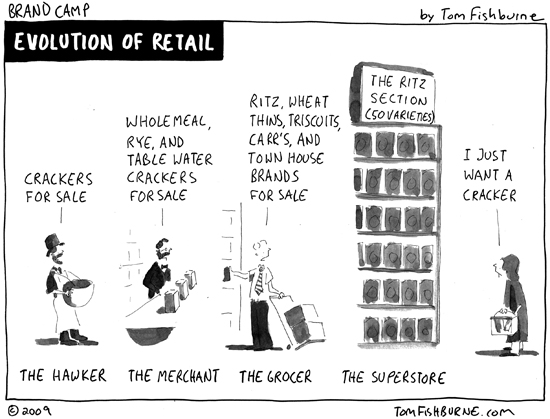
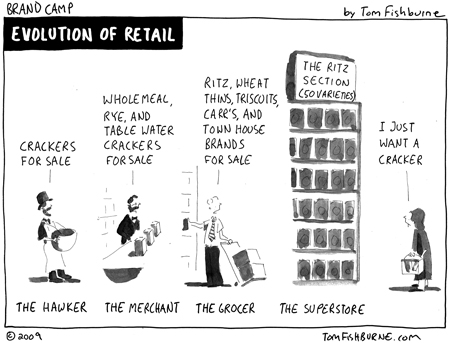
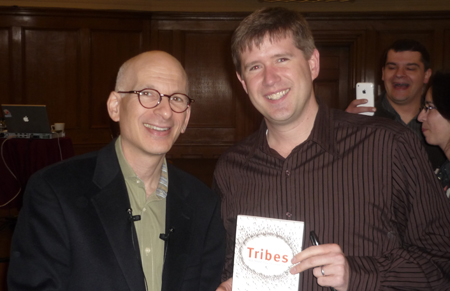
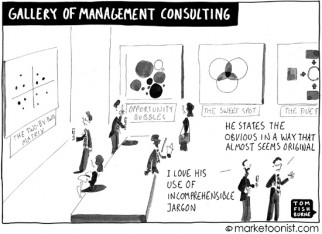
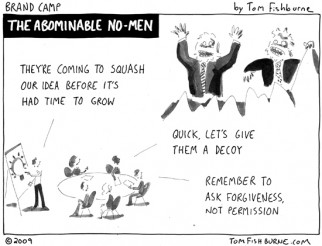
gregorylent says
since you are in london at times, you could perhaps go out of your way to meet umair haque, a leading edge, and young, economist with brilliant insight into the issues you raise in this post …
http://discussionleader.hbsp.com/haque/2009/01/a_users_guide_to_21st_century.html#comments is a good place to start .. his earlier blog, http://www.bubblegeneration has the development of his thought going back several years …
and as an aside, your post illustrates just how big the current paradigm shift is going to be, be all of the thinking that went into creating this stuff has to change …. the “crisis” will not be over until it does …
re-valuation, big-time, is the joy of this time …
enjoy, gregory lent
Chris Wilson says
Today on what was supposed to be a quick trip to Wal-Mart, I was thinking the same thing as I dug through the 40+ different kinds of granola bars. Sadly I didn’t find what I was looking for. I guess proliferation squeezed it out.
BTW – I’m jealous. I keep telling myself that I’ll get to see Seth speak live one of these days.
Seth Godin says
The thing is that the game theory of the competitors means that no one is going to do anything about this. Each competitor has an incentive to do seven flavors!
Perhaps we’ll see a retailer who figures this out, though.
Brilliant riff, as always Tom
Kelly says
Great post – I always think it’s funny how as one brand proliferates (and towards no real consumer need), there is always one brand doing better beacsue they offer simplicity.
(and love the pic – esp the guy in the background who looks like he’s taking a pic of you with Seth)
Denise Lee Yohn says
tom — re: “And it made me question how much of that choice is truly meaningful.”
it might seem meaningful to the salespeople at packaged-goods companies who are trying to dominate the shelf — as you observe, “a new product launch is just table stakes to keep another facing in the store.”
choice also might seem meaningful to the R&D folks — if each new variation is considered an “innovation,” then these folks are building a track record as they introduce more and more choices.
and choice might seem meaningful to the brand managers who are trying to boost market share — they try to appeal as many different consumers as possible by offering as many different feature sets as possible.
but if choice isn’t meaningful to consumers, then what’s the point? many a research study has proven that offering consumers too much choice actually decreases their purchasing — that alone seems to make a strong case against choice proliferation.
thanks for the great post.